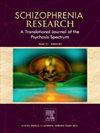CBT for psychosis in Parkinson's disease: A framework for how and why
IF 3.6
2区 医学
Q1 PSYCHIATRY
引用次数: 0
Abstract
Psychosis is a serious comorbidity to Parkinson's disease associated with high levels of distress and disability but access to effective treatments remain limited, leading to high rates of emergency hospitalization. Here, we propose a new framework for how cognitive behavioural therapy (CBT) may be used to treat Parkinson's disease psychosis. We note specific adaptions, including aims that focus on reducing distress and disability and extending quality of life; tailored psychoeducation; assessment and formulation that additionally includes disease course, medication effects and side-effects, and Parkinson's specific social factors; addressing anxiety and depression alongside cognitive appraisals for the types of psychotic symptoms more common in Parkinson's disease; appropriate reality testing sensitive to disease progression; and trigger monitoring and management for hallucinations and delusions that carefully distinguishes this from avoidant coping. We review preliminary case study-level evidence for the successful use of CBT for Parkinson's disease psychosis and suggest a road map for its formal evaluation before integration into evidence-based healthcare.
认知行为疗法治疗帕金森氏症的精神病:如何及为什么的框架
精神病是帕金森病的一种严重合并症,与高度痛苦和残疾有关,但获得有效治疗的机会仍然有限,导致紧急住院率很高。在这里,我们提出了一个新的框架,如何认知行为疗法(CBT)可能用于治疗帕金森病精神病。我们注意到具体的调整,包括侧重于减少痛苦和残疾以及延长生活质量的目标;定制的心理教育;评估和配方,还包括病程、药物效果和副作用,以及帕金森病特定的社会因素;解决焦虑和抑郁以及帕金森病中更常见的精神症状类型的认知评估;对疾病进展敏感的适当现实测试;并触发对幻觉和妄想的监控和管理,仔细地将其与逃避性应对区分开来。我们回顾了初步的案例研究水平的证据,成功使用CBT治疗帕金森氏病精神病,并建议在纳入循证医疗之前对其进行正式评估的路线图。
本文章由计算机程序翻译,如有差异,请以英文原文为准。
求助全文
约1分钟内获得全文
求助全文
来源期刊

Schizophrenia Research
医学-精神病学
CiteScore
7.50
自引率
8.90%
发文量
429
审稿时长
10.2 weeks
期刊介绍:
As official journal of the Schizophrenia International Research Society (SIRS) Schizophrenia Research is THE journal of choice for international researchers and clinicians to share their work with the global schizophrenia research community. More than 6000 institutes have online or print (or both) access to this journal - the largest specialist journal in the field, with the largest readership!
Schizophrenia Research''s time to first decision is as fast as 6 weeks and its publishing speed is as fast as 4 weeks until online publication (corrected proof/Article in Press) after acceptance and 14 weeks from acceptance until publication in a printed issue.
The journal publishes novel papers that really contribute to understanding the biology and treatment of schizophrenic disorders; Schizophrenia Research brings together biological, clinical and psychological research in order to stimulate the synthesis of findings from all disciplines involved in improving patient outcomes in schizophrenia.
 求助内容:
求助内容: 应助结果提醒方式:
应助结果提醒方式:


